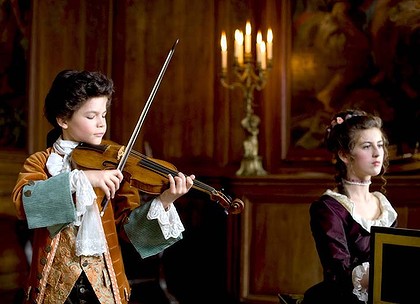Showing @ Filmhouse, Edinburgh until Sun 22 Apr – run ended
René Féret / France / 2010 / 120 mins
Had history been different, had talent rather than gender been the defining factor, then the CD racks and concert halls might have known two Mozarts. Not just Wolfy (as he’s known in this film) but also his equally talented sister Maria Anna – known as Nannerl. At least that’s the conceit at the heart of writer/director René Féret’s film.
Outside of brief mentions in Wolfgang’s letters there’s little to prove that Nannerl ever composed music – she left no manuscripts and no mention was made in father’s correspondence, but this hasn’t stopped Féret coming up with this delicate and touching tale based around the domestic lives of the family Mozart as they tour Europe, performing for its crowned heads.
It’s with this intersection between the Mozart clan and royalty that the film moves from the known facts of Nannerl’s life to speculative fiction, as she first encounters and befriends Louise, one of the King’s younger daughters hidden away in a convent, and then begins a strange relationship with Clovis Fouin’s Dauphin, who patronises her talents as a composer and allows her private audiences – as long as she is dressed as a man, of course. It’s an interesting conceit and the frustrations of talent unacknowledged – especially by Nannerl’s own father – and the heady effects of royal patronage makes for a delightful if rarely believable tale. Marie Féret, the director’s own daughter, has a certain blankness in her performance, whether this is down to choice or her relative inexperience is hard to tell, but it seems to fit the character – thrown perfectly into a bewildering and heady world of privilege and power.
By far the most interesting character in the film, and the one whose story you’d really like to follow, is Wolfy and Nannerl’s father Leopold. Marc Barbé paints him as a driven, ambitious, slightly unscrupulous, but ultimately loving figure, trading on the prodigious talents of his children, but knowing that one day they must leave him. It’s far removed from the traditional portrait of the domineering, abusive showbiz father as Barbé imbues the character with real empathy. Handsome as this picture is to look at, ultimately there’s less to this film than meets the eye. Apart from the underlying theme of sacrifice which is never fully explored, Féret chooses instead to lose himself in the costumes, wigs, décor and music. This doesn’t in any way make this film an unpleasant proposition, just one where an opportunity has been missed.


Comments